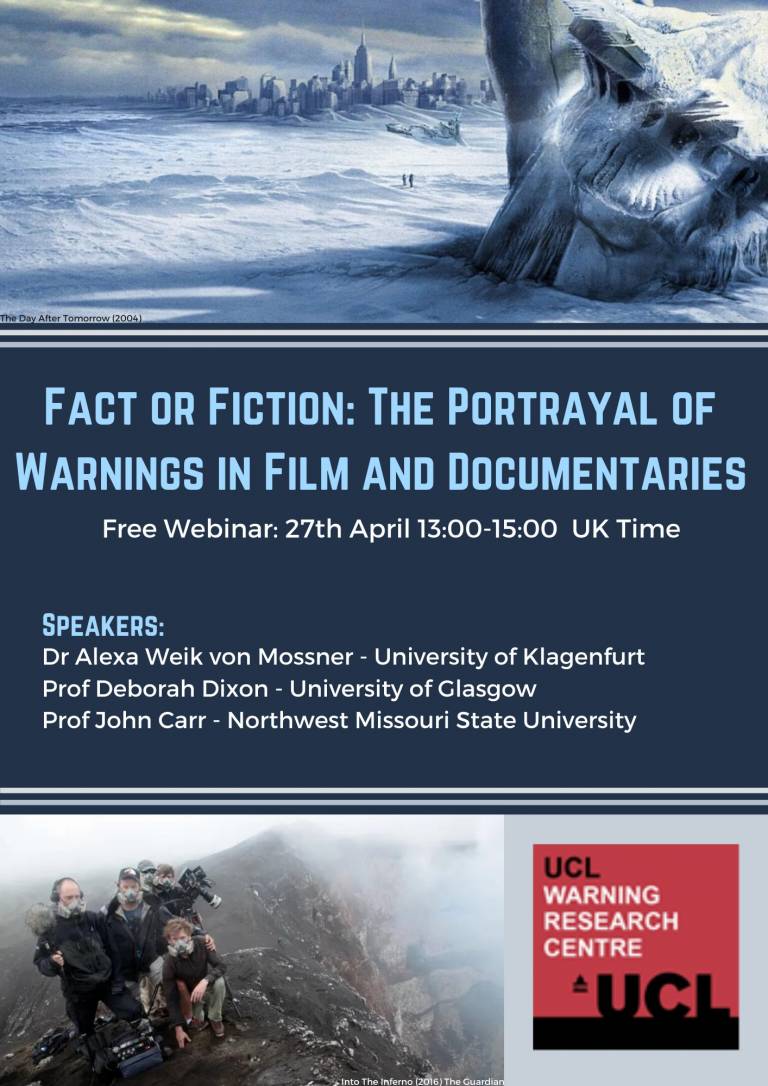Fact or Fiction: The Portrayal of Warnings in Film and Documentaries
27 April 2022, 1:00 pm–3:00 pm

This webinar brings together academics from across the globe to discuss the different portrayals of warnings and disasters in films, both documentary and fictional.
This event is free.
Event Information
Open to
- All
Availability
- Yes
Cost
- Free
Organiser
-
UCL Department of Science and Technology Studies
This webinar brings together academics from across the globe to discuss the different portrayals of warnings and disasters in films, both documentary and fictional. This webinar will provide the opportunity to learn more about representations of warning systems in disaster films, how effective documentaries are in engaging the public and raising awareness, and how film itself can act as an important element of warning systems.
Webinar Program:
Introduction by Dr Carina Fearnley – Director of the UCL Warning Research Centre Introduction.
Presentation by Prof Alexa Weik von Mossner Filming at the Eleventh Hour: Environmental Documentaries as Warnings
Summary: The past two decades have seen an explosion of documentary films dealing with a wide range of pressing environmental issues, including pollution, resource extraction, food production, species extinction, and climate change, among others. Many of these films utter stark warnings about an unsustainable or even catastrophic future ahead of us if things don’t change. The talk will consider some of these warnings and discuss how they are structured and framed, what filmic and rhetorical means are used to make them persuasive, and whether such warnings in film are useful if the goal is to get people to act on these issues.
Presentation by Prof Deborah Dixon: Animating the Sublime: Between Horror and Control.
Summary: How does film 'work' to shape attitudes and opinion? To instigate and shape feelings? To bolster political support, or to challenge the taken for granted? Film geographers are not interested in the accuracy of film content as much as they are how it emerges from and articulates social relations of power, how it is animated by cultural beliefs and normative assumptions, and how it effects in the moment and in the aftermath. Here Prof Dixon talks about the importace of the sublime to film. This well-established, fundamentally conservative trope continues to dominate the disaster genre, but has also become the'go to' for many Anthropocene-focused films.
Presentation by Prof John Carr: Discussion on the various representations of warning technologies in recent films, both accurate and inaccurate
Summary: Disaster movies are often the entry point for people learning about disasters, and the way that our disaster management systems operate during events. While some movies get things right, many do not, potentially leaving viewers with an inaccurate framework of how a disaster would look in real life. With Warnings and Emergency Alerts specifically, these movies may be putting citizens at risk. This session will discuss the representation of warnings and disaster management in general in disaster movies, and what the long term impacts of this influence may be according to science education research.
Presentation by Maddie Guthrie on how film can assist in prompting imagination amongst the public regarding disasters, and how film can be integrated into early warning systems.
Q&A led by Maddie Guthrie, with Dr Alexa Weik von Mossner, Prof John Carr and Prof Deborah Dixon as members of the panel.
About the Speakers
Alexa Weik von Mossner
Associate Professor of American Studies at University of Klagenfurt
Associate Professor of American Studies at the University of Klagenfurt. Her research explores contemporary environmental culture from a cognitive ecocritical perspective. She is the author of Cosmopolitan Minds: Literature, Emotion, and the Transnational Imagination (U of Texas P 2014) and Affective Ecologies: Empathy, Emotion, and Environmental Narrative (Ohio State UP 2017).
More about Alexa Weik von MossnerJohn Carr
Professor at Northwest Missouri State University
John Carr serves as Program Coordinator for Emergency and Disaster Management at Northwest Missouri State University. His research includes citizen engagement in emergency management, emergency management education, and the influence of disaster movies on the public’s perception of disasters and related operations.
More about John CarrDeborah Dixon
Professor at University of Glasgow
Distinguished professor at the University of Glasgow, co-founder and editor of the new inter-disciplinary (American Association of Geography) journal GeoHumanities. Her research includes feminist geopolitics, film geographies and different social, cultural and environmental practices within the Anthropocene. She is the author of Feminist Geopolitics: Material States (2015) and led the project “Engaging in Art/Science Collaboration: Communities, Visual Economies and the Spaces and Practices of Exhibition and Display’.
More about Deborah Dixon Close
Close

